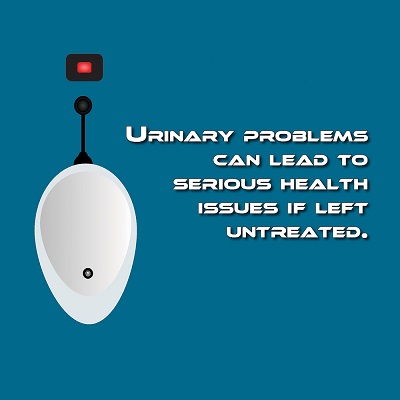 Just like the other parts of your body, there are conditions that affect your urinary system. Some of these health problems are common among women, others are more specific to men, while a few affects both genders. There are different types of urinary problems, each with its own set of symptoms and causes.
Just like the other parts of your body, there are conditions that affect your urinary system. Some of these health problems are common among women, others are more specific to men, while a few affects both genders. There are different types of urinary problems, each with its own set of symptoms and causes.
Bladder Dysfunction
This can be characterized by loss of bladder control, incomplete emptying of the bladder, frequent urination, difficulty urinating, weak urine flow, and urine leaks. Its common causes include bladder irritation, blockage in the urethra, and nerve damage.
Urinary Tract Infection
When you feel a burning or painful sensation when you urinate and notice cloudy and strong-smelling urine in small amounts, you’re most likely suffering from a UTI. This condition, which occurs when bacteria invade your urinary tract, may affect your kidneys, bladder, or urethra.
Urinary Retention
If you’re unable to empty your bladder completely, you may have a problem with urinary retention. A lot of factors can cause urinary retention, including kidney stones, bladder stones, blockage, urethral stricture, medications, nerve problems, and even cancer.
Bladder Stones
Concentrated urine may create solid masses of minerals in the bladder. It is a condition that is common among men who are at least 30 years old. It generally occurs when you always fail to empty your bladder completely or if you have benign prostatic hyperplasia.
Urethral Stricture
Urethral stricture refers to a scar that prevents urine from flowing freely from your bladder. It may occur when your pelvis and urethra sustain an injury. You’ll feel pain in your lower abdomen or pelvis, decreased urine flow, blood in urine, and frequent urination.
Dysfunctional Elimination Syndrome
Dysfunctional elimination syndrome is common among children. It is characterized by the loss of bladder control, along with constipation, and recurring UTI. This type of urinary problem often appears among children after toilet training while others have it due to an inborn or present anatomical issue. The common symptoms include daytime wetting, bedwetting, constipation, bowel accidents, and infrequent urination.
Interstitial Cystitis
If you’re feeling pressure or pain in your bladder and pelvis, you might be dealing with interstitial cystitis. You feel the urge to urinate, but the amount of urine you produce is less than usual. Women are more at risk of having this condition, which may worsen if they have a UTI too. Doctors may use medicines, physical therapy, nerve stimulation methods, and even surgery to treat interstitial cystitis.
Neurogenic Bladder
A problem in the brain, spinal cord, or nerves may cause a loss of bladder control, which could further lead to other urinary concerns. Symptoms vary among affected individuals, but in most cases, the patient can have an underactive or overactive bladder, as well as repeated UTIs.
What are the Common Symptoms of Urinary Problems?
If you have urinary problems, you may experience some or all of the following.
- Pain in the abdomen, lower back, or pelvic area
- Bloody, cloudy, or foul-smelling urine
- Fever and chills
- Frequent urination
- Urine leaks
- Loss of bladder control
- Incomplete emptying of the bladder
- Pain or burning sensation when urinating
Consult your doctor right away if you notice at least one of these symptoms along with high fever, nausea, and vomiting.
Factors for Urinary Problems
Several factors may increase your risk of having urinary problems. The most common ones are the following.
- Inborn anatomical problems in the urinary tract
- Suppressed immune system
- Recent urinary procedure
- Diabetes
- Unsafe sexual practices
- Pregnancy
- Family history of urinary problems
- Not drinking enough water
- Systemic diseases
- Surgery of the urinary tract
- Menopause
- Use of diaphragms and spermicidal agents
Possible Complications of Urinary Problems
Urinary problems can lead to more complicated health issues, such as –
- Permanent kidney damage
- Chronic pain
- Impotence and infertility
- Higher risk of delivering premature infants among women
- Sepsis
Common Treatments for Urinary Problems
The treatments vary depending on the type of urinary problem. In most cases, your doctor may prescribe medicines to treat the infection, relax the bladder, and minimize the pain. You may be asked to use devices that will support your bladder, undergo physical therapy, or have surgery in serious cases.
Urinary problems can lead to serious health issues if left untreated. Minimize your risk of complications by visiting your doctor immediately when you notice signs of urinary problems. Your health care provider will create a treatment plan for your specific urinary problem.






